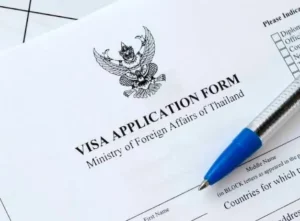A company that qualifies for protection under US-Thai Treaty of Amity can also obtain a Foreign Business Certificate (FBC). The Commercial Service office at the Embassy can certify this.
A FBC allows a company to be granted national treatment, meaning it is exempt from restrictions under Thai law. This is a major benefit.
Business Visas
The US and Thailand have enjoyed a special commercial relationship for more than 180 years under the terms of the Treaty of Amity. The Treaty affords American citizens and companies national treatment when conducting business in Thailand.
For foreign citizens seeking to open and operate a business in Thailand, the nonimmigrant visa category B is available for multiple-entry and is valid for three years. Applicants for this visa must also submit proof of financial means and a letter from their employer indicating the nature of their work in Thailand.
In addition, foreigners who intend to conduct business in Thailand may apply for a work permit at the Thai Immigration Bureau Office. However, work permits are limited to specific sectors and the number is restricted. In addition, the Foreign Business Act still governs the majority of businesses and restricts ownership by foreigners. This can result in a long waiting time before the work permit can be issued.
Foreign Business Certificates (FBCs)
Companies that seek protection under the Treaty of Amity must be incorporated in Thailand and certified as such by the Commercial Services Office (CSO) at the U.S. Embassy in Bangkok. The CSO will verify that the company has been registered in compliance with Thai law and that the majority of the shares are owned by American citizens.
These companies will be exempted from most restrictions imposed under the Foreign Business Act, including those that limit foreign ownership of certain sectors and that require prior government approval. However, the companies must meet minimum capital requirements and bring their funds into the country to receive these benefits.
The status of the Treaty of Amity is currently uncertain, as it expires January 1, 2005 and could be replaced by a free trade agreement or eliminated altogether. In addition, the World Trade Organization has given Thailand until 2005 to reform its treaty obligations and grant national treatment to all WTO member nations.
Ownership Rights
Under the Treaty of Amity, American companies can operate in Thailand with majority ownership. The company must be incorporated in compliance with Thai laws. Generally, all owners and stockholders must be American citizens either by birth or naturalization. A majority of the directors must also be Americans. The Commercial Services Office (CSO) of the US Embassy will verify that the company meets these requirements.
In addition, the company must have a registered capital of at least THB 2 million or more. Companies that do not meet these requirements will have difficulty in obtaining work permits for their employees.
Companies incorporated under the Treaty of Amity cannot purchase land directly in Thailand. This restriction can be circumvented by establishing a land-owning Thai subsidiary. However, this arrangement has significant legal and tax implications and should be carefully considered. In addition, the US-Thai Amity Treaty allows only certain activities to be performed by Amity Treaty companies, and it excludes most businesses regulated by specific Thai law such as telecommunications, banking, life insurance and non-life insurance business.
National Treatment
National treatment provides for full protection and security of property owned by nationals and companies of both parties in the territory of the other party. However, exceptions to investment restrictions can be provided by laws regulating exceptions issued by the BOI or IEAT. The exceptions may include promotion privileges and/or tax and duty exemptions. In addition, the Supreme Court has discretion to take specialized appeal cases.
The Department of Intellectual Property’s backlog of patent examination has increased the time it takes to obtain a patent in certain technology sectors, as well as in pharmaceuticals.
The Government of Thailand has established a national committee, including top-level representatives from 11 agencies, to develop policies and strategies to promote intellectual property rights, fight infringements and improve the protection and enforcement of intellectual property. Gratuity payments to civil servants are still a common practice, and those firms that refuse to pay bribes may be at a disadvantage in the marketplace.










